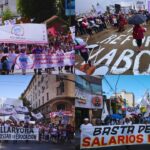
Four legislatures, two presidents, a motion of censure, the arrival of Pedro Sánchez, the emergence of Podemos, Ciudadanos and then the extreme right and two coalition governments. All of these events have happened since 2013, the last year in which there were no electoral calls of any kind. And without ruling out an advance in some of the communities or even a new turn of the helm by the president that calls for general elections – something that is actively and passively denied by Sánchez – the parties are preparing this 2025 as an unknown scenario and warming up its machinery for the next cycle, which will begin with the Andalusian ones in 2026.
In 2013 Mariano Rajoy governed with a very large absolute majority of 189 deputies. Spain was still suffering the effects of the economic crisis and the social climate set the conditions for the birth of a party, Podemos, which was the beginning of the end of the two-party system that has marked more than a decade of electoral repetitions, unexpected advances and the first motion of successful censorship of democracy: Sánchez’s in 2018.
Although recent years have seen a sharp decline in the alternative left and a recovery of the two major parties, the coalition government lacks stability in the Congress of Deputies. This fragility invites us to think, as the difficulties in passing laws forward grow, in a new electoral advance that Sánchez rules out for the moment: both the PSOE and Sumar are determined to complete the legislature, although to do so they need to carry out their first General Budgets of the State.
The second way that could break that milestone of a 2025 without elections is that of the autonomous communities. In recent weeks, some rumors have emerged that speak of a possible early call in Castila y León and the Balearic Islands, both with PP governments that have been weakened after Vox decided in the summer to leave all the coalition executives after the pact that Alberto Núñez Feijóo reached for the timely distribution of migrants from the Canary Islands, Ceuta and Melilla to other territories of the country.
Vox also threatens not to support the budgets of the PP governments after the main opposition party held a meeting with Moncloa to negotiate a stable distribution of migrants, which ended unsuccessfully due to the total blockade of Feijóo’s party.
In Castilla y León, Vox has already assured that it sees itself “prepared” for an advancement scenario that the regional president, Alfonso Fernández Mañueco, rejects. But it would not be the first time that Mañueco attempts a maneuver in search of an absolute majority. In 2022, when he governed in coalition with Ciudadanos, he already called elections early. Then the move went wrong and what he managed to do was replace the self-proclaimed “liberals” with those of Abascal. It was after those elections the first time that the extreme right acceded to an autonomous government since the return of democracy.
If the first coalition government brought stability for the first time since the 2016 elections, since 2020 both the PSOE and Unidas Podemos had to introduce at least one election per year into their analyses. In 2020, the Galician and Basque elections were held. A year later, advances were made in Catalonia and the Community of Madrid. In 2022 there were elections in Castilla y León and the Andalusian elections were held that gave the absolute majority to Juan Manuel Moreno Bonilla. In 2023 there were regional and general elections that Sánchez brought forward a few months. And last year, with Sumar in the new coalition government, Galician, Basque, European and Catalan celebrations were held that Pere Aragonès anticipated and that gave victory to the socialist Salvador Illa.
The Government is preparing this year for an uncertain scenario in which its parliamentary negotiations are not conditioned to what may happen in any of the territories of Spain. Last year, Sánchez decided to postpone the Budget negotiation after the advance in Catalonia, understanding that in an electoral context in that territory it would be impossible for Junts and ERC to reach an agreement in time.
2024 was also marked by the electoral contests of some of the main partners of the Government, such as EH Bildu and PNV, with whom the PSOE also maintains an agreement to govern in Euskadi that was revalidated in the Basque elections that gave victory for the first time. to the pro-independence left, despite the fact that he could not govern. Another conflict is the clash between Sumar and Podemos, which after breaking up at the state level competed in Galicia, Euskadi and also in the European Championships in June.
After that cycle, many eyes were focused on the congresses that the two pro-independence parties held at the end of 2024 to reorient the course for the coming years. Carles Puigdemont came out of his party’s meeting strengthened and Oriol Junqueras won just a few weeks ago in a disputed contest.
But not only the Catalan independentists have carried out processes to prepare for the new electoral cycle. The PSOE itself held a Federal Congress in November with which Sánchez also activated organic processes in its territories, with an eye toward the following regional elections, and especially those most sensitive for the party.
One of them is Andalusia, which may also be the first to hold elections. The following are scheduled for the summer of 2026. Hence the movement of the PSOE to place the Minister of Finance, María Jesús Montero, as general secretary of the party in that region, with the idea that she will be the one who competes with Juan Manuel Moreno Bonilla to try to take the government from him and send a message to the generals in the territory that contributes the most seats to Congress, 61, and which until the arrival of the current president had been the main socialist fiefdom.
Also the left, in continuous reorganization, has congressional processes this year. In March, Sumar will hold an assembly that will convert the formation of the second vice president, Yolanda Díaz, into a traditional party, the Sumar Movement, and has also already activated a territorial deployment to generate cadres in the main autonomous communities. Podemos, for its part, has just renewed leadership in several territories, including Andalusia, and a new Citizen Assembly is planned for the summer.
Source: www.eldiario.es

